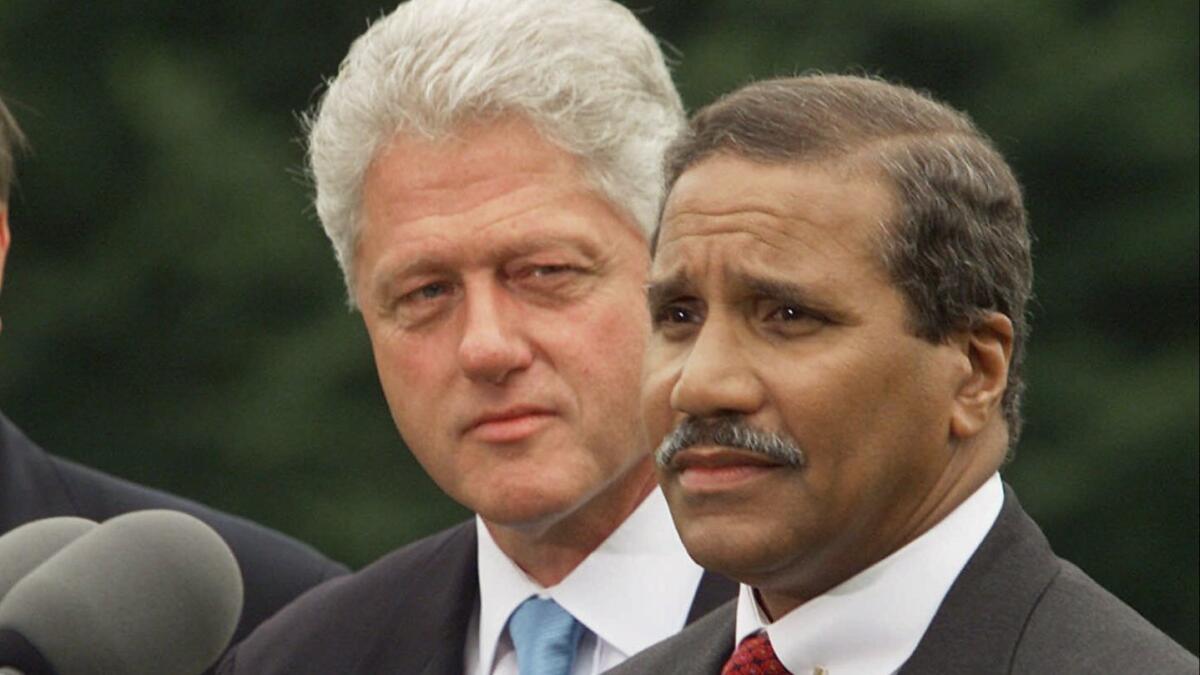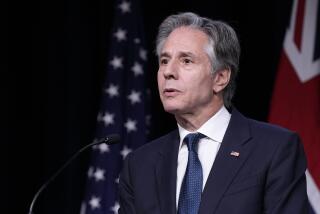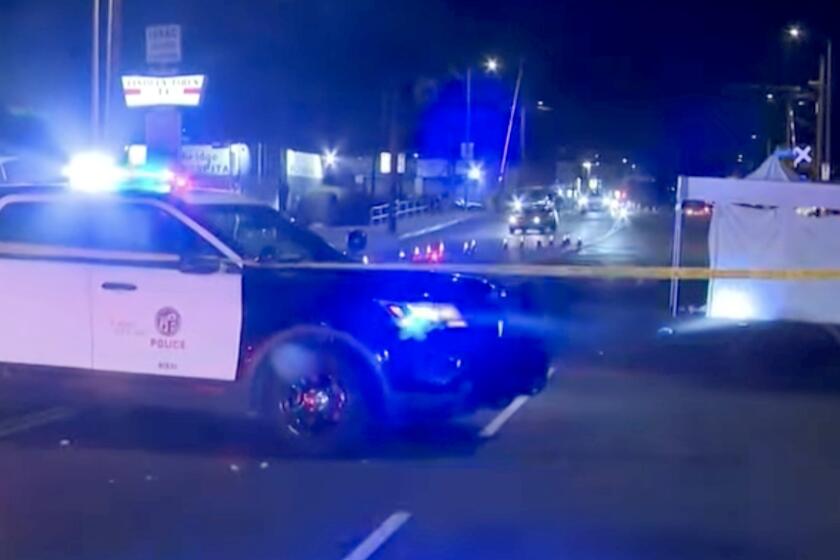Togo D. West Jr., Clinton appointee who led Veterans Affairs and investigated Army abuses, dies at 75

Togo D. West Jr., a government lawyer and high-ranking Clinton administration official who oversaw Army investigations into sexual harassment, served two rocky years as secretary of veterans affairs and later directed investigations into the mistreatment of veterans at Walter Reed Army Medical Center and the roots of the 2009 mass shooting at Ft. Hood, died Thursday on a Silversea cruise ship traveling between Barbados and Puerto Rico. He was 75.
The cause was a heart attack, his daughter Hilary Carter West said.
The son of North Carolina schoolteachers, West served as an Army lawyer in the Judge Advocate General’s Corps and worked as the top lawyer in the Department of the Navy and Defense Department under President Carter.
He became the second African American to serve as Army secretary when President Clinton nominated him to the post in September 1993 after the acting secretary, John W. Shannon, was charged with shoplifting a $30 blouse and skirt from the base store at Ft. Myer in Virginia.
The incident marked the beginning of an unusually eventful tenure for West, who was tasked with shepherding a Cold War Army into peacetime and implementing the Clinton administration’s “don’t ask, don’t tell” policy toward gay troops.
“He assumed office at a particularly sensitive time,” Richard Kohn, a military historian at the University of North Carolina, wrote in an email. “He seemed undercut in accomplishing a great deal by the gays controversy, an Army leadership focused on dealing with [Defense Secretary Les Aspin’s] ‘bottom-up review,’ budget cuts, controversies over interventions abroad, and changes in threat planning resulting from the end of the Cold War.”
As the Army’s senior civilian official, West oversaw a drawdown that reduced the branch from 18 to 10 active divisions, reorganized its reserve wings and battled criticism that the Clinton administration was using political patronage to determine who would be honored with burial at Arlington National Cemetery.
West also orchestrated a rise in the number of opportunities for women in the military, said Joe R. Reeder, former undersecretary of the Army. “We opened I think more posts for women than had ever been done before, and any time you have changes like that it’s a big challenge,” Reeder said.
In perhaps his most prominent action as Army secretary, West ordered an investigation into senior officers’ responsibility for sexual abuse at Aberdeen Proving Ground in northern Maryland, where in 1996 three male instructors were charged with rape and other sex crimes against female recruits. More than 50 recruits eventually came forward with allegations of sexual abuse at the base.
He went on to launch an investigation into each Army base that trains female soldiers and appointed a nine-member civilian-military panel that proposed changes in Army training and sexual harassment policies.
While West’s handling of the sexual assault investigations drew praise from many on Capitol Hill, his tenure at the Department of Veterans Affairs was marked by accusations of mismanagement, as well as long-standing complaints that the department was doing too little to ensure proper healthcare for veterans.
Appointed department chief in January 1998, West inherited a sprawling system of 172 hospitals, 132 nursing homes and more than 650 clinics.
Behind the scenes, he soon began battling a White House spending plan that would have decreased VA funding when accounting for inflation.
In an internal memo, West wrote that the proposal for the 2001 fiscal year would have limited veterans’ access to emergency care, turning them into “second-class citizens” and “would raise significant doubts about the administration’s commitment to veterans.”
An additional $3 billion was eventually added to the bill, but West received scant credit. He was by then mired in separate controversies over his travel practices — he sometimes used rented limousines and chartered military airplanes, a violation of government rules — and over what an inspector general’s report described as an atmosphere of “total chaos” at the VA’s Office of Congressional Affairs.
He resigned in 2000.
“Under his leadership,” Clinton said at the time, “the VA has begun to confront some long-neglected problems head on, reaching out to more than 400,000 veterans who were exposed to Agent Orange, pressing for answers to the Gulf War syndrome and proper care for those who suffer from it, beginning the process of building five new national cemeteries . . . and making a special effort to bring homeless veterans back into the society they did so much to defend.”
Togo Dennis West Jr. was born in Winston-Salem, N.C., on June 21, 1942. He and his father, a math teacher who became a high school principal, were named after the Japanese naval hero Togo Heihachiro, whose leadership during the Russo-Japanese War dominated newspaper headlines at the time of Togo Sr.’s birth.
West initially worked as an electrical engineer, but after receiving his bachelor’s degree from Howard University in 1965 he switched to law, graduating from Howard’s law school in 1968.
He joined the Army one year later at the suggestion of his father, and received military honors including the Legion of Merit and the Meritorious Service Medal before embarking on a career in government.
West was a senior vice president and top lobbyist at Northrop before joining the Clinton administration, where he briefly held dual posts as Army secretary and chairman of the Panama Canal Commission.
An Eagle Scout, West served on the Boy Scouts of America’s national executive board and was president of the Joint Center for Political and Economic Studies, a self-described “black think tank,” after leaving the Clinton administration.
But he seemed to find a return to government hard to resist. He joined former Army Secretary John O. Marsh Jr. in leading a 2007 investigation into red tape and decaying facilities that hampered care at Walter Reed.
A few years later, he and Adm. Vern Clark, former chief of naval operations, oversaw a Pentagon review into the 2009 shootings at Ft. Hood, in which an Army psychiatrist killed 13 people. The shooter was Muslim, leading West to warn against proposals to spy on troops, particularly on the basis of religion.
“Do we want commanders in the mosque? No,” West said. “What we want is commanders’ awareness of what’s going on in their unit. . . . Sometimes there are warning signs that need to be paid attention to and passed along the chain of command.”
Survivors include his wife of 51 years, Gail Berry West of Washington, a lawyer who served as deputy assistant secretary of the Air Force under Carter; two daughters, Tiffany West Smink of Denver and Hilary Carter West of Washington; and two grandchildren.
More to Read
Sign up for Essential California
The most important California stories and recommendations in your inbox every morning.
You may occasionally receive promotional content from the Los Angeles Times.










